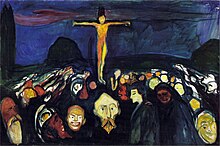Richard T. Gray
Appearance

Richard T. Gray is Byron W. and Alice L. Lockwood Professor in the Humanities at the University of Washington.
Quotations
[edit]Stations of the Divided Subject: Contestation and Ideological Legitimation in German Bourgeois Literature 1770-1914 (1995)
[edit]- The narrative that emerges in the interpretations developed here presents a critical counter-narrative to the ideological self-understanding of the bourgeois subject as autonomous, rational, self-perfectible in-dividual. The account tells the (his)tory of the subject's often violent political self-disciplining, a self-coercion whose disciplinary methods vary from the extreme of brutal self-repression to the more moderate mode of cautious political self-restraint. The history of the bourgeois subject in Germany appears as the story of a massive repression of certain insights on the part of middle-class intellectuals into the pernicious political and cultural implications of bourgeois socioeconomic praxis.
- pp. 23-24
- "Literature" names a discourse in which semiotic elements constantly disrupt the institutional codifications of the symbolic order.
- p. 25
- The individual artist plays the role of a kind of "damaged" vessel into which subjectivity flees in its attempt to escape the reifying effects of bourgeois practice. Artists embody the last outpost of subjectivity, they are neurotic Messiahs, as it were, who represent for all humankind the final hope for salvation from the wholly administered and rationalized world.
- p. 26
